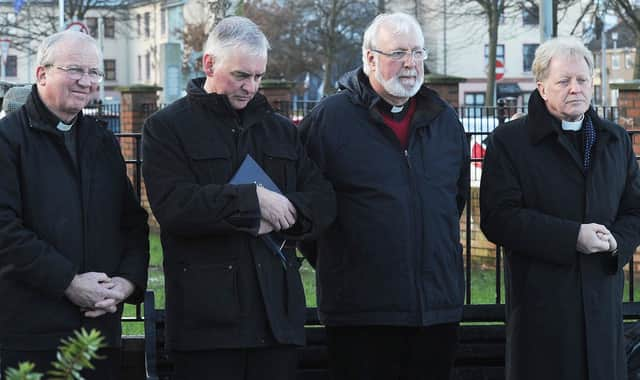Bloody Sunday 50: Families have succeeded in setting the record straight


Since my ordination, 40 years ago, it has been a privilege to lead prayers each January for the victims and survivors of Bloody Sunday.
Annually, around the anniversary, in winter sunshine, downpours and snow, we gathered united in remembrance of those who lost their lives that day and in solidarity with those whose lives were forever changed by the events of Sunday, January 30, 1972.
Advertisement
Hide AdAdvertisement
Hide AdOne of the characteristics that is extolled at various points in the Bible is the quality of ‘constancy’, which means fortitude or steadfastness under duress. The 50th anniversary of Bloody Sunday is an appropriate occasion on which to recognise and acknowledge the constancy and steadfastness of the Bloody Sunday families in speaking up for and speaking out for their loved ones and in maintaining their campaign for justice for the dead and wounded.
In the immediate aftermath of the atrocity, the injustice of what had been visited upon the victims and, indeed, upon this whole community, must have seemed blindingly obvious: after all, there were thousands of marchers on the streets of the Bogside that day, diving for cover and running for shelter under a hail of bullets. There were journalists and cameras there to witness the carnage; people who were present recounted in detail the horror of what happened.
Very quickly, though, the ‘narrative’ was seized by people in power to blacken the names of the dead and wounded and to try to justify the massacre.
The late Lord Widgery’s now discredited public inquiry concluded that some of those killed and wounded had been “firing weapons or handling bombs” and that some others had been “closely supporting them”.
Advertisement
Hide AdAdvertisement
Hide AdThe late Bishop Edward Daly, who was in the thick of the firing that day and who, for the rest of his life, was deeply affected by the atrocity, recalled that, “Bloody Sunday was a tragedy; but ‘Widgery’ was a travesty.”
It took the British state almost 40 years to acknowledge officially that “none of the casualties was posing a threat of causing death or serious injury” or was doing anything that could “justify their shooting”. In the words of then Prime Minister David Cameron, “What happened on Bloody Sunday was both unjustified and unjustifiable. It was wrong.”
Critically, Mr Cameron confirmed that the Widgery Report had now been “fully superseded by the Saville Report”.
That admission, that concession, did not come easily to the British establishment. It had to be fought for; it had to be wrung out of them. Bloody Sunday was the first incident in British legal history to earn a second public inquiry. It took 38 and a half years for the state to admit officially that none of the dead or wounded was doing anything “that could, on any view, justify their shooting”.
Advertisement
Hide AdAdvertisement
Hide AdBloody Sunday is one of those rare incidents when history – the narrative of what happened – has been corrected, officially and indisputably, and that is a remarkable achievement.
The families bereaved by Bloody Sunday, and the people who were injured that day, did not need a British prime minister or a tribunal of inquiry to prove that the dead and wounded were innocent. But history did need to hear that. And future generations need to know that.
Some relatives remain determined that people should be brought to account for what happened. They are entitled to seek justice. That is their right. Whether or not they ever achieve justice remains to be seen, but it is their absolute right to pursue it.
Sadly, though, whatever happens or doesn’t happen in the courts, the great wrong done on Bloody Sunday cannot be undone. A friend of mine quotes the great Seamus Heaney in this context: “No poem or play or song”, Heaney wrote, “can fully right a wrong inflicted and endured.” Nothing will bring the innocent dead back to life.
Advertisement
Hide AdAdvertisement
Hide AdHowever, on this 50th anniversary of Bloody Sunday, I want to pay tribute to the families and campaigners who – by their constancy and through their steadfastness – have succeeded in setting the record straight, for the most part, and who have stood up for their loved ones so heroically.
Over the years, I have come to know and respect many of the bereaved relatives, as well as some of those who were injured in the shooting. I have also got to meet, to know, and to admire men and women who survived the paratroopers’ onslaught, including quite a few who risked their own lives in an effort to save others. It has been an honour to know them and a privilege to pray with them.
Through their fortitude and fidelity, constancy and steadfastness, the families, the wounded and their supporters have done their loved ones, their city and, indeed, history, a very great service, and, for that, we should all be truly thankful.